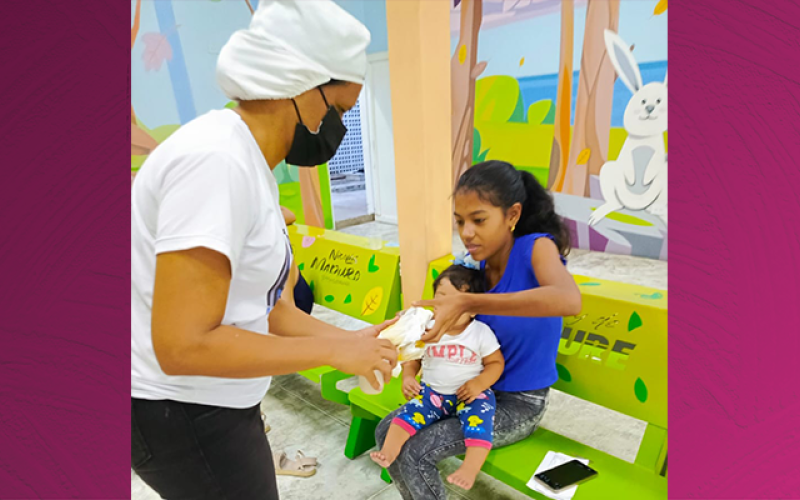
University students design campus water campaigns
When Nazarene Compassionate Ministries issued a challenge to Nazarene universities to address the global water crisis, students around the world responded.
The contest challenged university students to design and implement a Water Challenge campaign with three goals: to educate about the scarcity of clean water worldwide; to embody spiritual practices and acts of service; and to raise funds for clean water projects in communities where water is scarce. Student teams from Africa Nazarene University, Asia-Pacific Nazarene Theological Seminary, Mount Vernon Nazarene University, Northwest Nazarene University, Philippine Nazarene College, Point Loma Nazarene University, and Trevecca Nazarene University submitted proposals. The top three proposals received awards that include implementation grants and a financial award for the university, and the fourth-place proposal received an implementation grant.
First place went to the Drop by Drop campaign proposed by Trevecca Nazarene University. According to Stephens Hiland, a communications/mass media major who served on Trevecca's five-student team, the proposal process was an opportunity for students to apply their studies to an issue of significance.
"Often in college, we learn about social justice issues and we learn about our majors, and it's very rare that those things overlap," Hiland said. "In the end, we want Trevecca students to be empowered to make a difference both in our backyard and globally, not for our own sake, but for the glory of God."
Jamie Casler, who directs the J. V. Morsch Center for Social Justice at Trevecca, notes that Hiland is not alone in the desire for practical ways to live out faith.
"Students at Trevecca are asking how they can connect their major toward creating a more just world," he said. "The Water Challenge campaign … will allow students to apply their academic learning and skills to create awareness while generating funding for clean water projects."
Casler also believes it is important for students to see "how the Church is responding to today's social justice issues."
The "Drop by Drop" campaign will take place over a few weeks, first by partnering with different offices and programs on campus to build awareness of the issues surrounding water around the world. Hiland notes that they want to "give the issue a face" by telling the stories of people who have been affected by water scarcity.
The student leadership team will then organize various activities, including a water relay in which teams have to fill up a large barrel with water by hauling buckets to a water source and back. Different teams will represent different regions of the world, each with unique requirements. For example, a group representing the average American would have to haul more water to represent the larger consumption in the U.S., while a group representing Mexico would not need to haul as much water, but they would have to travel farther to get it.
The goal is to "make the water crisis personal and tangible for those participating," Hiland said.
Throughout the campaign, several students will also carry 5-gallon jerry cans around campus. The containers will have the Drop by Drop logo and information about water issue.
"This will prompt questions and allow students to really engage in a discussion about the global water crisis," Hiland said.
The "Drop by Drop" campaign, which will take place during the Lenten season, will also ask students to give up drinking coffee, soda, or any beverage other than water and then to give the money they would have spent on those drinks toward clean water projects.
Dan Boone, Trevecca president, sees the Drop by Drop campaign as integral to the mission of the university.
"Trevecca is all about two things: the formation of Christlike character and the development of real world relevance," he said. "By serving the health of our fellow humans, we do both. We want students to have hands-on experience in being the hands and feet of Jesus through the development of their capacity to address human need."
Point Loma Nazarene University's "Hello Friends!" campaign earned second place in the NCM Water Challenge. The campaign is designed to bring together students, faculty, and staff across academic disciplines and to build on an existing relationship with a Nazarene church in Democratic Republic of Congo (DRC).
The campaign, which begins February 9, will use technology and media to focus on inter-personal connections. An interactive space on campus, in conjunction with a website that includes an "impact dashboard," will highlight the effect of the water crisis on specific communities in DRC. The interactive space will also allow students to interact directly with Pastor Celestin Chishibanji, who serves as a pastor and NCM coordinator in DRC, through video chat. The student proposal explains, "While listening and learning from the community in the DRC, our campaign seeks to educate and inform the college community about global poverty, clean water obstacles, and hygiene/sanitation challenges experienced by our friends living in another part of the world."
The one-week campaign will also include soap making in collaboration with the science and business departments, collecting toothbrushes that will be delivered to DRC through one of PLNU's LoveWorks summer missions teams, and a beach clean-up day to be held in coordination with an activity focused on sanitation in a Congolese community.
The students hope to raise at least $6,000 to build a water well at a school in DRC through "Hello Friends!"
Rob Gailey, who directs PLNU's Center for International Development, emphasized the importance of a multi-disciplinary approach to the campaign.
"We've been committed to getting students aware of poverty issues through the center for international development—understanding global poverty and how to respond," he said. "Clean water is one of the issues that a lot of students care about. If we can join across multiple disciplines, we'll have a greater impact."
Gailey explained the focus on relationships is crucial.
"I hope we'll set a standard that there is a way of connecting with churches in other places," he said.
Taylor Cate, a PLNU nursing major with a minor in nonprofit management, would like to see the project go beyond the PLNU community.
"To see the campaign implemented at Nazarene churches across the state would be promising," she said. "Even if 50 students went to their home church and said, 'Let's raise $6,000 to build a well,' imagine how many lives would be changed.
"I can't wait for the second week of February. We hope Point Loma's students raise enough money to build a well at a school in Congo. This could be life-changing."
The third-place challenge award went to Northwest Nazarene University for its "Ripple Effect" campaign, which is designed to raise awareness and then implement a water project at a school for children with special needs in Haiti; and fourth place went to Mount Vernon Nazarene University for its Belize Clean Water Coalition, which will focus on a partnership with rural communities in Belize to create access to clean water. Other entries included a proposal to implement clean water resources in schools in Olosirkon, Kenya, from Africa Nazarene University (ANU); a proposal to provide clean water in Nalseb, Philippines, from Philippines Nazarene College (PNC); and a proposal from Asia-Pacific Nazarene Theological Seminary (APNTS) for the "Bridging Christ Through WASH" project, which focuses on an ongoing relationship with a low-income neighborhood called Rowenas.
The NCM Water Challenge awards were designated to mobilize seminary, college, and university student bodies around advocacy and awareness about water, sanitation, and hygiene needs around the globe. The participants from ANU, APNTS, and PNC developed fully integrated proposals that involved Water, Sanitation, and Hygiene projects to benefit water-scarce communities near their campuses. Each of these schools will have the opportunity to work alongside NCM staff to further develop their proposals to implement an NCM-supported water project in these communities. This opportunity is unique for college and seminary students and one that NCM hopes to continue to develop with other Nazarene educational institutions.
--Nazarene Compassionate Ministries


